Text
Watch Us Rise
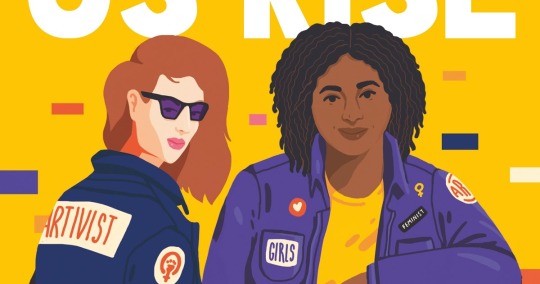
This week’s reading of Watch Us Rise has been a good read. I would say that as the book goes on, I appreciate Jasmine’s character more and more. Chelsea tries to be an ally it seems but isn’t doing a great job at it.
Chelsea as an ally is currently boggling my mind due to the way the t-shirt ordering went down. I was so surprised to see that she was very inconsiderate and didn’t think of the fact that Jasmine would need a larger size t-shirt. This speaks to the idea of the thin privilege that Chelsea seems to enjoy. I think that the authors put this in the book for a purpose though. It could be the author painting Chelsea as a human who sometimes makes mistakes like we all do. Or a reader can look at it and see that maybe Chelsea’s feminism needs expansion to include various other marginalized and minority groups. Either way, we could make a case for both. This situation could be a learning lessons that helps us see Chelsea as still learning. Our characters are in high school so we can say that this is just part of her learning and it just slipping her mind that she should ask Jasmine her size in order to make sure she’s comfortable. We can also say that this lesson can expand Chelsea’s feminism. The topics Chelsea seems to focus on that she’s passionate about are very general ideas that affect women. Having this experience can expand Chelsea’s outreach and how she includes plus-size women in her activism. Fatphobia is a forgotten issue when it comes to feminism so having her address this issue would most likely mean that others that look like Chelsea would be more likely to listen to her message compared to if the same message came from a plus-size individual due to the way society still views fat women. The discrimination that fat women face is still a problem that feminism should aim to tackle. Feminism is about everyone and equality and if thinness is this idea that is giving those with smaller waistlines more opportunities then thin women shouldn’t shy away from advocating for their plus-size peers. Of course, I don’t mean speaking over the experiences that plus size women have but just supporting them and advocating for them when it’s hard for this marginalized group pf people to do so is a great move in achieving more body positivity in our society. Every body is beautiful and sometimes we just need others to support that message in order to get it more mainstreamed so that people don’t struggle with issues of body insecurity and so that other bodies besides the norm we often see for those who are female presenting are also viewed as normal because all bodies do look different and that’s one hundred percent okay.
The scene at New Year’s where everyone made a resolution was very surprising to read as well. I thought that everyone said very on the surface things for their resolution. I think this speaks to how the group although close seems to not want others to disclose very personal close things. This idea is very common in young adulthood though. I remember being very close with my friends in middle school and high school but not telling them every personal thing about me. I think this could also speak to the idea that the group may not be as close as the reader thinks. I would venture to say that the writer included this information to make a reader think about the implications of the group’s friendship as a whole.
Finally, I have some questions for the girls and thoughts to say. I would say sorry to Jasmine due to her loss. I would also ask Chelsea about how her activism has portrayed out to be so far. I would ask the question if she herself believes her feminism is exclusive or inclusive.
0 notes
Text
Watch Us Rise
Watch Us Rise has been a great read so far. I would go as far to say that it’s my second favorite read this semester.
The one thing I believe was interesting was when the director of theater tried to assign Jasmine a stereotypical black woman’s role. I thought that since the acting trope was named the August Wilson acting ensemble that this trope would be as people say now “woke”. It’s ridiculous to think that people today still want women of color especially black women to continue to play these roles that perpetuate racist and stereotypical ideas. This idea is still prevalent in our current media. Black woman also faces this idea that lighter is better in regard to their skin when it comes to casting. Shows like the Bachelor and other dating shows typically will cast women with more European looking features. Love Island the British version of the Bachelor hasn’t casted people of color if we were to take a look at all previous cast members. A study was done by Essence magazine on typical roles that black actresses play are gold diggers, modern jezebels, baby mamas, uneducated sisters, ratchet women, angry black woman, mean black girls, unhealthy black women and black barbies. What does this say about our society as a whole? This says that black women and young black girls aren’t seeing proper representation in our popular media. Media representation is extremely important because it affects the way children see themselves and the way other people view marginalized groups due to the racist stereotypes that television and other media portray. None of these stereotypical roles show a positive message to people which is an extreme problem. In 2017 out of 250 box office releases less than 50 of these movies featured a black woman as a lead or supporting role. Again, this speaks to the lack of representation that is still in our society today. I have found two videos on YouTube that can speak to this idea. The first one is called Black Woman in Media and it’s published by BRIC TV. The second one is a TEDx talk by Tobi Oredein. It’s called how the beauty industry has devalued black woman. Lack of representation in media can link to the options of makeup for black woman being limited. White women are typically demonstrated as the only idea of beauty which correlates with this idea of women of not color not shown in a positive way. Black women especially suffer when it comes to this.
The second thing I would like to talk about is the way Chelsea’s version of feminism is demonstrated in the blog posts. I think that the way she represents her thoughts is typically better digested by the audience it seems due to the thoughts having more of this view that you’re made to see through her words. Jasmine’s posts are more about her own experience as a black woman which I believe can be hard for others to relate to her posts sometimes. Chelsea’s’ posts are limited in content due to the privilege she receives. Jasmine I believe has this way of writing which can rope in viewers that can relate to her experience. Jasmine offers a voice to those who have wanted to speak about the discrimination they have faced. Chelsea’s posts bring in an audience for those who are unaware to these general issues and things that are wrong with the way women are treated and how media portrays the idea of womanhood. These two viewpoints though are essential for the blog. They help create variation which I believe will attract a larger audience overall.
I have a few questions for the characters. My first question would be for Chelsea. I would ask her If she believes that her privilege as a white woman contributes to the way her involvement in this club is interpreted by others compared to how people may view Jasmine. I would then ask Jasmine how she would change the environment at her school.
0 notes
Text
Darkroom

Finishing Darkroom this week brought many emotions and topics to the table. Some concepts in the book I had never quite thought of before reading it in the text. Along with these emotions and topics brought some questions as well.
The first topic we spoke about was the idea of transnationalism. I had heard this word used before but never though in much detail about it before. I would say that Lila definitely didn’t show much of this idea in the beginning of the novel. We see this when she’s embarrassed by her parents speaking Spanish in public. If I’m being honest, I was disappointed to read this early on in the book. However, I think it help add to her character progression throughout the novel. By painting her as somewhat embarrassed of her cultural identity we can see her progress into really embracing who she is as a person to the end of the novel. We see this by when she’s taking Ben back to Argentina. I would say that this shows a complete 180 in her character. It makes the reader in a way think of themselves due to the natural progression everyone’s character goes through in their lifetime.
The second thing I thought of while reading was the way the locker room scene played out. We see Lila degraded by one girl in the locker room after trying to stop what she sees as a fight. This girl calls Lila a cracker and tells her they don’t need her help and that she’s not one of them. This scene I believe shows us an important idea of her not being welcomed in by either group. Although the approach was very wrong in handling this case it also shows us the amount of tension that people were under during the civil rights times. The girl didn’t hate Lila, she hated what Lila represented in a way. Lila could be seen as white passing which makes others dislike her due to the way other white people were treating black people at the time.
The third thing I thought of when Papa started not attending church. I imagine this would have been very hard for him due to his incredibly strong faith. I wonder if Papa ever then found a church that he felt comfortable in later in life then. It’s crazy that a place that should be so accepting of people wasn’t. It’s almost hypocritical in a way because the church is supposed to represent a safe space for everyone. Everyone has differences but those differences are what make us human. Segregated churches show this idea of almost sin for being of a different race in a way if black people aren't allowed to worship there as well.
I have a few questions for the author and characters as well. I would ask the author what inspired her to write this story? Did she run into any problems during the publication process that delayed the publication date by a lot? When did her passion in drawing become known? Did she like writing the book or drawing it more? I would also ask her dad how did his experiences shape his overall national attitude of the United States? Did he find raising his children hard here due to the discrimination they faced? I would ask Mama about her experiences working. Was working in the United States how she pictured it? Did she feel as if her family was welcome in the space they were living? Was she nervous about the move to the United States? My next question is a question for the whole family. The question is Is the United States like you’ve imagined it? I’d guess that the things they were hearing about the U.S. didn’t touch on the topic of the way black people were being treated differently than their white counterparts.
0 notes
Photo
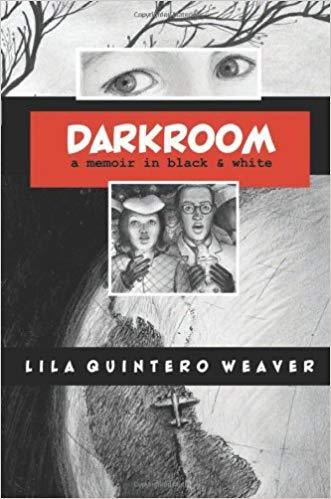
Darkroom has been an interesting read so far. Although, we haven’t seen much I’m excited to hear more about the experiences her family went through and ones they witnessed happening around them as the book goes on. I’ve made connections with events that have happened in the book.
The first thing I made a connection within the book is when Lila is embarrassed about her parents speaking Spanish in public. I don’t have a first-hand experience with this, but my grandma did when he grew up which made me think of how he may have related to our narrator. My great grandma was first generation Mexican American. Her parents immigrated to the United States shortly before she was born. Her parents spoke Spanish frequently at home as well as English. My great grandma wanted to make sure her children knew how to speak Spanish due to it being an important value her parents passed on to her. My grandpa and his brothers were so embarrassed when my great grandma would speak Spanish to them while out in public. They were fine with it being spoken at home but once they stepped out of the house Spanish was a no-go zone for my great grandma to speak. They would frequently tell her they didn’t like it and how people would stare at them when she would speak Spanish. They weren’t embarrassed of the fact that she was speaking Spanish, they were embarrassed that other people could then identify them as different than them due to this. Kids would pick on my grandpa and his brothers due to racist ideas they learned from their parents and others. My great grandma then stopped speaking Spanish pretty much all together because she didn’t want to add to reasons why these kids would pick on my grandpa and his brothers. My great grandpa convinced her that if they didn’t speak Spanish maybe others would view them as more “American” which really, he just meant whiter.
The past situation I described also correlates with this new one. The students at Lila’s school ask if she can speak Spanish which she obviously can. I myself personally can relate to this experience. Many people at my high school knew I was Mexican. They thought that since I was Mexican shouldn’t it be obvious that I can speak Spanish too. Which is not the case for me. The Spanish teacher from Honduras even asked me on the first day of class If I spoke Spanish at home with my parents. Which I understand why he would ask; he was just seeing If I had prior experience with it before. I took his class for three days and then dropped. When I was dropping his class, he told me it was such a shame I didn’t speak Spanish with my parents and how I must have a huge disconnect with my culture. Experiences like this don’t stop in high school. They continue on. We have a desk assistant at my residence hall who is in Multicultural Student Affairs. I told him I was in it too. He asked me which other student organizations I was looking into. I told him I was looking into the Latino Students Organization. He then asked me if I was Latino. I said yes and he asked me what countries specifically. I told him Puerto Rico and Mexican. He said, “Oh so you speak Spanish, right?”. I told him that I didn’t, and he said, “oh so you’re not really Mexican then”. I was so confused about what he meant. Not being about to speak Spanish doesn’t make me less Mexican than others.
0 notes
Text
Farewell to Manzanar
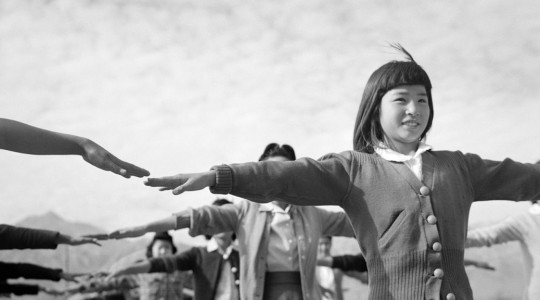
This week’s reading of Farewell to Manzanar brought multiple emotions to me as I finished the book. This book taught us an important lesson about history to our class. Jeanne as a narrator may not always be reliable but her story is one that needs to be read.
The first emotion I felt was sadness. Jeanne’s story is very similar to In the Time of the Butterflies. When we read their stories, we become immersed in the environment they were in. Jeanne’s story brought the emotion of sadness due to the mistreatment described in the book. In my history courses in high school we didn’t touch much on Japanese Internment Camps. We knew they existed, and many were placed in them, but the treatment of Japanese Americans wasn’t discussed. This simple fact made me sad. It’s almost as if their history has been erased if they aren’t educated on it. Everyone should learn about this history so that it isn’t repeated. I mean look at our current political climate and events happening and it’s eerily similar. As long as we continue to see people as “other” or “different” from us events like this will keep happening in our country. It’s up to us to speak up and talk about it in order to combat these issues. The more that stories like Jeanne get out the more awareness is brought to the topic.
The second emotion I felt was happiness. I was happy that Jeanne was able to tell the story of what happened to her family. I think that writing all of this down could be in way therapeutic to her. It could help her deal with her PTSD by helping her talk more about what happened to her with professionals. Writing in a way can help you get the issue you’re writing about off your chest. Many people support writing in a diary or a journal as a good self-care option. I used to write a personal diary in elementary school which really helped me express myself when finding the words to speak was. Having this outlet especially for Jeanne definitely helps put in perspective what she felt during childhood and how that impacted her adulthood.
Finally, I have some questions for Jeanne. I would ask her if writing this book was helpful with her PTSD? I know it must have been hard but did writing it help her in a way? Bottling up an experience like this certainly couldn’t have been good for her mental health before. I would also ask her what her whole publishing experience was like. Did she ever feel discouraged that her story wasn’t going to be published? How did her husband’s family react to knowing Jeanne went through this? Were they aware of how terrible the internment camps were? Did they support their son James as he was going through the publishing process with Jeanne? I would ask James how he felt knowing Jeanne just carried this experience with her for so many years without telling him. As her spouse I wonder if he felt that Jeanne didn’t trust him enough to tell him such an emotional experience like this. Or was he just surprised to hear all the details that Jeanne and her family went through while in Manzanar.
0 notes
Photo
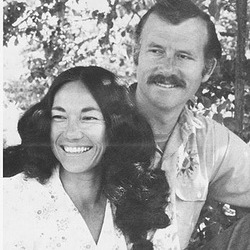
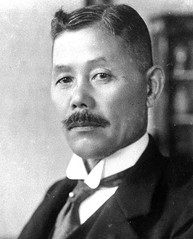
This week’s reading of the multiple chapters in Farewell to Manzanar made me think a few thoughts.
I feel really bad for Jeanne in these chapters. She talks about how she doesn’t really fit in with the rest of her family. One classmate described the way they treat as “pet-like” which looking back now it’s fairly obvious Jeanne is treated that way. I would describe Jeanne personally as the clown of her family. Of course, her older siblings like her sisters like her but it seems as since she’s the youngest that she has to kind of entertain her siblings in order to be liked or viewed as a valid member due to the huge age gaps in the family. I just thought of Jeanne as an afterthought to her family. Especially when Papa forgets her name but remembers all of her other siblings. That situation didn’t happen in real life, but it really says something about the way Jeanne thought her father viewed her. Jeanne is very naïve in this text but it’s how our author meant to portray her. Many books written in child perspective are this style for the character to transport the reader back into this time of childhood innocence. The idea of childhood innocence is important for some scenes due to the softening effect that it can bring. Her innocence protects her against the harsh reality of what’s going on around her in the camp.
I dislike Papa’s in these chapters. He gets on my nerves with his actions. Him forgetting Jeanne’s name bothered me. Papa resembles my own father in some of his actions which makes me quick to judge him as a character. Overall, I see why his character is important. It establishes the mood and it helps set her family tone which I can appreciate as a reader.
I have a few questions for the characters. My first question is for Mama. Why does she stay with Papa and cater to him when she can do better? Sis can do so much better. My next question is for Papa. Why are you such an asshole? I understand his character has been through a lot but he needs to develop better coping skills. My last question is for Kiyo. How he has been affected by the internment camp? Is he having a hard time coping mentally with his external situation right now? Has that lead to him having destructive internal conflict?
0 notes
Text
Farewell to Manzanar: Post 1
This week’s reading of Farewell to Manzanar was quite an interesting read. My history classes touched briefly on Japanese internment camps. We never really learned about the true accounts of what life was like in the camps though. It was always more of our government did this in order to protect our country and that was it. I never imagined it like the way our narrator describes.
The first thing I want to comment on is in the foreword. In the foreword our narrators say they were told by a New York writer told them “It’s a dead issue. These days you can hardly get people to read about a live issue. People are issued out.” Unfortunately, this is very true of our current climate. So many things happen in our country and across the world and many people don’t care. There’s just too much going on that people often turn a blind eye to current issues. They don’t know how to fix these issues or face emotional overload when seeing media describing these events so much that they’re drained when it comes down to it. It’s not that people don’t care it’s the fact that there’s always a tragic event happening on in the world, so it becomes hard to single in on just one issue happening.
Jeanne says some powerful words that I believe will stick with the reader. She says about her experience “It’s not a political history. It is a story, or a web of stores-my own, my father’s, my family’s.” I think this an important sentiment to carry as we read the story. This story yes is historical fiction. However, real people are involved and lived through this tragic event. We can’t diminish that fact as we continue on reading the things that happened at Manzanar.
Henry Steele Commager’s quote made me realize how fucked up the United States really has treated people who belong to minority groups in its overall history. We always hear excuses like “well it was for our protection back then” but really if we did proper investigation we wouldn’t have to go to these extreme measures. We can’t just single one group of people out and lock them away because of what people who have no relation to them did.
I like that the narration is done through young Jeanne’s eyes. It makes it easier to see the story through a child’s prospective. It allows for easier digestion of the story when hard moments are presented. Very similar to a narration like Julia Alvarez in the time of the butterflies.
When they were taking the family to the internment camp it’s kind of made me connect to our current political climate. Many undocumented people are being taken to detention camps in the United States. It’s not just undocumented people, some United States citizens are even being detained. I specifically thought of Francisco Erwin Galicia. Francisco was taken into Border Patrol’s custody after being accused that his documents which proved he was a citizen were invalid. He was traveling with friends for a scouting event for soccer. He was stopped by Border Patrol and had multiple proof of documents like a birth certificate, social security card and a State ID. It’s just crazy that we somehow don’t even believe that citizens are valid. This relates to the story simply because those of Japanese descent who were citizens had been detained. Why would you detain your own citizens? That’s beyond messed up.
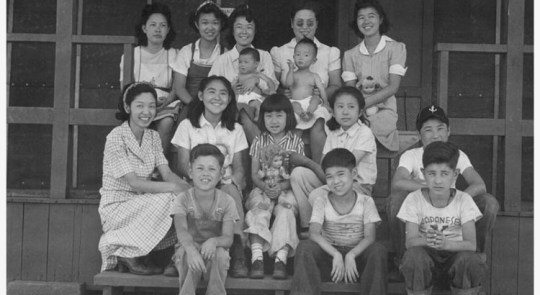
0 notes
Text
Real Women Have Bodies
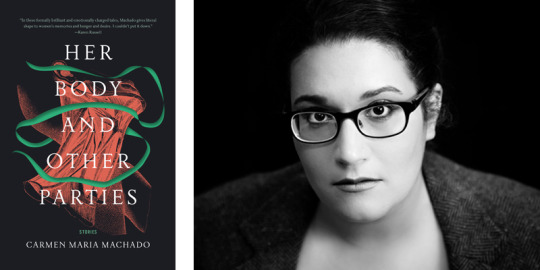
This week’s reading was very shocking to me. The tittle of this piece of literature didn’t set off the style of horror in me when I first read the tittle. After reading this piece I have many thoughts about the story.
The first thought I had was what was the issue affecting the women? I originally thought of it as a plague like illness. I thought that this illness possibly could have been a large percentage of eating disorders developing in young women and adults alike. We see that there’s even toddlers fading away in the story. The young children aspect makes it especially scary. It makes you think of people you know and love. We don’t want individuals we hold close to us fading. I think that’s why it was important that the woman Petra who was fading was the lover of our narrator. It allows a reader to place us in her shoes possibly. Everyone has a woman in their life who they love whether it be a best friend, a romantic partner, your aunt, your mother or your grandma. Seeing this happen to women especially makes the reader think. I believe the author made the victims of this illness or plague happen to women due to how society still views women and issues affecting them. Women historically have faced issues and people either didn’t care enough to listen or didn’t value the women enough to find a solution to their issues. People usually don’t care about these issues unless they happen to somebody they love. That’s the whole point of the story I believe. Even though the narrator was a woman she didn’t seem that concerned with what was happening to the women around her until it was Petra.
The idea of women stitching themselves into the dresses made me think it was a critique on the way the fashion industry is run. Most models nowadays weigh 23% less than the average woman. Many models meet the criteria for diagnosing an eating disorder known as anorexia. Plus size modeling agencies have models who are size six working for them. What does this say about our society? I would argue that our fashion industry is still pushing the image that thinner is better on young women and men. I mean just look at applications like Instagram. There is so many influencers on that social media website that advertise products like flat tummy tea and flat tummy lollipops. These products aren’t beneficial for anyone’s health. Flat tummy tea is just a repackaged acceptable version of MiraLAX for god’s sake. Flat tummy lollipops’ intended purpose is to suppress your appetite so that you don’t eat for a few more hours. The fact that these products can be easily accepted by many people is outrageous. Why do we accept this as a society? We send the message to easily impressionable people that what they look like organically isn’t good enough. Sorry for the language but that’s bullshit. We need to make sure that those especially who are younger aren’t exposed to messages telling them that their body is inherently wrong for something they can’t control. The other part of the text that made me associate this with the fashion industry is when our narrator talked about how the lack of color in the store is there to lure the consumer into an existential crisis and then purchase. This so reminiscent of the way many beauty products are marketed to us. Advertisers make us feel bad about something and then we get insecure due to constant advertising and then end up purchasing these products. We didn’t buy these products initially because we weren’t insecure about it at first. We just grew insecure overtime and then buy the product to boost our self-confidence.
0 notes
Text
And then there was One: Dede

This week we wrapped up In the Time of the Butterflies. This ending brings a reader multiple emotions. I would say that this story brings both happiness and sadness to the reader when they are finished reading the story.
The reader is brought to the emotion of sadness when the sister’s death is described in chapter 13. We all knew the story was going to end this way. However, we had the slightest glimmer of hope that the book would magically change so that the sisters live. I would say that every reader is hoping for the sisters to somehow live. We become so attached to Patrias love for her family, Min’s dedication to the revolution and Mate’s dedication to her religion. We formed a strong connection to these women over the course of this story. We pictured what they looked like and how they sounded through their words on the pages. Although this was a sad part of the story it teaches the reader a strong lesson about advocating for yourself and others during a time of injustice. It shows us the resilience that many people had to have in order for us to be alive today. These women can be viewed as role models for women and young girls. Many times, we don’t hear historical events from a woman’s perspective. Much less from women who belong to marginalized groups. This book is a great example of how representation matters. People who read this book can get perspective on a time they may not be privy to. I know that I never learned about the struggles the Dominican Republic actually went through during my years of taking history. Which is kind of sad if you think about it. The public school teach about the struggles many countries often face after the United States gets involved in their countries.
Although the story brings us sadness it does bring an element of happiness. We’re happy that Dede is now having a part of the revolution even though it’s after her sister’s death. Dede becomes a representative for her sisters with the new government. She helps with official events in her sister’s honor. I like that she doesn’t shy away from the memories of her sisters after they’ve passed. I also like that Dede is finally showing off her badass side. Dede is finally free from her husband. I think this is the authors way of showing a new Dede. Dede can go out and live her life freely now without the control of her controlling husband. It’s almost as if the author wrote Dedes' life like this in order to show us a rebirth of her character.
As per usual I do have some questions for the characters. I would ask Dede how she finally got the courage to get divorced. I believe that her marriage did play a big role in her life during the revolution. In a way this marriage basically saved her life at the end due to her husband not wanting her to get involved. I would ask Peditro why he married a young girl after basically starting his life over. Does he love her truly? Did Leandro leave the revolution because he was scared to end up like the sisters?
0 notes
Text
In The Time of the Butterflies

This week’s reading is my favorite out of all the readings so far. The story has really progressed and is getting into more personal information with the sisters which I like. The reader gets to see how Dede’s family operates which is quite interesting.
Dede’s husband Jaimito gets under my nerves as a reader. He’s very confusing to pin down for me personally. In the beginning of the chapter I definitely saw him as a classic sexist abusive husband. But, my idea of him changed throughout the chapter. I was quick to judge him as a sexist abusive husband due to the way he seems to lead the family. He shoved Dede into the bed which set off red flag alerts in my head immediately. He has very old-fashioned views which make me slightly nauseous as a woman in these modern times. He annoys me very quickly when he takes the boys and leaves with them. Dede goes to the house he fled to and asks to see her sons which makes me happy regardless of the sad vibes Jaimito gives me. However, he is quick to reclaim the boys as his sons. Of course, they are his sons as well due to genetic makeup but really? Dede carried those children for nine months and went through two deliveries in order for them to even come into this world. Jaimito can't even say our sons when talking about the boys? That’s very depressing to me. What a way to leave Dede out of her own family unit. I like that Dede is becoming brave and is standing up for herself though. I imagine it would be quite hard to do in not only a country in national distress but one that also is very sexist in its views towards women. Jaimito blaming other people for his own martial issues is an issue that also paints his character in an abusive way. Many abusers will do and say that they and their victim get along and are happy. However, this is simply not the case. The abuser often times does actions that are abusive but wants them to be hidden. This seems to be Jaimito’s point of view. He doesn’t want Dede to tell others what Jaimito is putting her through because he knows his actions are wrong. So, when these conflicts arise, he points them back to others because he truly can’t handle knowing that he’s wrong due to his machismo/traditional upbringing where men were always right. Jaimito although abusive does seem to care about Dede’s family which confused me. He tries to bribe the officer to not arrest Mate. I think this does show that he cares about the family. In this action and chasing after Mate he does join the revolution although unplanned. When you combine the abusive tendencies and this situation together you get a confused reader like me. I have a few questions for Jaimito. Are you emulating how your father treated your mother in regard to how you treat Dede? Do you see that it isn't other people getting involved that’s hurting your marriage? Why can’t you take responsibility for your actions? How much more are you going to put Dede through? Would you be happy if your boys grow up to treat women the way you treat Dede?
Chapter ten upset me for different reasons. Patria praying to Trujillo is extremely upsetting. Trujillo isn’t a god, so it makes me sad that she feels the need to pray to him in order to give her a sense of peace. I’m slightly happier once I see how committed Peditro is to Patria. The government sending prostitutes into the church is depressing. Church is supposed to be a holy place and the fact that Trujillo’s government believes it’s okay to do that makes me sick. Such a terrible way to get those devoted to turn against their religion. I liked the black towel hanging out of the jail window. It shows some happiness during a time of darkness. Nelson being released also was a happy moment. It slightly upset me that it was to stroke Trujillo’s big ego.
Mate’s last diary entry made me slightly sad and happy at the same time. I was happy to see Mate’s character development. The way she treated those prostitutes in prison made me ecstatic to see the way her character has changed over the course of her time. It really seems that her views are changing. I like that Min is continuing the revolution even when she’s locked up for participating in the revolution. The diary entry remined me when I was in third grade and kept a diary. This made the diary easy to digest and to relate to. I really feel for Mate’s character. I see myself in her. We’re both naïve at times where it isn’t always beneficial. Being naïve can help you sometimes through hard times when you have to protect yourself from having z negative view, but it isn’t always a trait we want to have. My heart truly broke once I read the torture that Mate went through. I could only imagine how traumatic that must have been for her to go through. Especially since she wasn’t the only one tortured in that situation. Trujillo’s men also tortured Leandro psychologically by having to see Mate like that. Knowing this was her last diary entry made me read through it at a slower pace because I enjoyed hearing her voice and the perspective she gave to the story.
Discussing the reading in class this week made me have a few thoughts and questions. One classmate I believe Laurence said Mate’s voice could be described as childlike and whiny. And then he imitated a voice that seemed very different from the way I view Mate’s voice in the story. I was going to comment back to him and ask if he views her that way due to Mate being a woman. Many times, men have trouble understanding a character like Mate due to gender or other differences. I know in my high school literature classes many boys in my classes couldn’t understand female characters. They would describe them as whiny even if they were talking about horrendous treatment they went through. I don’t believe Laurence meant to be sexist with this comment. I think he may have had a hard time relating to Mate due to the way society seems women and views women when they speak about issues they’re facing. The sad truth is we’re more likely to listen and believe something when it is said by a man. If I could ask this classmate a question, I would ask him if he would have viewed the situation Mate was in differently if it was a man instead of a woman and if a male voice described the torture and horrendous situation the country was in.
Overall, I really liked this reading, but I do have a few questions to ask some characters. I’d ask Min how she stays so strong and continues the revolution while literally being prisoned for being part of the revolution. I’d ask her how the revolution and caring about it being an everyone problem weighed on her mental health. It must be so hard to be strong for not only your family but while also being a leader of a revolution in a country where political unrest is happening. I’d ask Mate how she got the courage to stand up to Jaimito. I’d ask Nelson about the conditions of the prison. Was he treated badly like Mate due to family connections with Min and the others? I’d also ask what motivated him to join the revolution. Did he join because of his family being involved or did he seriously want to join the revolution to help the country go against Trujillo’s regime. I’d ask Mama how she felt once her girls were locked away. Was she proud of them for being in the revolution or was she wanting them to get out in order to keep them and their children safe? I can only imagine since she’s their mother that she would want them to get out to keep the family and their young children okay. I’d also ask Mama how she seems to be so strong given all the struggles she faced throughout her life.
0 notes
Text
In the Time of The Butterflies

The text this week gave me many emotions when I read. This book continues to surprise me every week with the twists and turns it gets into. I never thought I would have intense emotions to this book when I first heard the tittle of it. However, the story inside makes a reader think and experience it in a way that it’s almost like there's a fifth Mirabel sister.
The first connection I had with the text this week was when Minerva is talking about love. Her idea of love is very romantic movie/fairytale idea. She says “The man I’d love would look like the poet in a frontispiece, pale and sad with a pen in his hand” to illustrate this idea to the reader. Her dad shows his overprotectiveness by not wanting her to wear slacks in public because women didn’t wear pants in these times. He shows discomfort by his face paling when Min says about him having momma still at him if she was to go to university. When she discovers that Papa has another family it also made me connect it with a personal experience of mine. My parents split when I was younger and although the situation isn’t exactly similar it has the tone of family still. My father had a child with his now wife also my stepmom and I was shocked to see that my dad had started another family. Sorry a bit personal!
Reading the part where Min must accompany her father to Trujillo’s party upset me. We all know Trujillo wanted her to go because he wanted to have sex with her. I don’t want Min’s character to end up like the girl from school who ended up getting pregnant from Trujillo. As Trujillo’s character develops, I keep seeing him as Dominican version of our current president. The personality qualities seem to be eerily similar. The lack of consent with pulling Min to him and making sexual comments that are gross given the context and climate make me not only cringe but slightly gag while reading the story. Very gross when he groups Min on the dance floor too!
I’m glad Mama stood up for herself though! The attitude of women in this book keeps getting more disgusting as time goes on, I’ve noticed. When the general says “young ladies are the flowers of our country” it makes me both sad and angry. Women aren’t weaker due to us being a. different sex. Look at the number of women in our armed forces now!
I liked when Min corrected Mama about whose fight it was exactly. It’s a fight that all citizens in the country are facing. Everyone has to do their part in what they feel comfortable with in order to truly achieve the end goal. The fight is for the Dominican Republic and against Trujillo. Everyone in the country is impacted by the current situation of the country.
Maria Teresa’s diary entry upset me slightly when reading them. I’m upset that she doesn’t welcome her half-sisters, but I also understand that it could also be everything going on causing her to act like this. Papa’s death was surprising but at the same time I’m not terribly sad about his death in the book. I feel bad for Maria and just want to give her a hug due to the grieving process she is going through. The part about her cousins grosses me out still. Mama’s letter to Trujillo again makes me sad due to the society they are living.
Chapter 8 made me question a lot of things in the story. It made me wonder why Patria views her life as better than her sisters. Does she view herself as inherently better due to marrying and starting a family? Is activism a worse life to live compared to the life women were supposed to live at the time? Well Patria doesn’t seem to be the image of perfect because her own son is sleeping around with multiple women. Patria’s life is shown to be almost sad due to how overprotective she is. Peditro arguing about sending the child to boarding school was another element that made me question the story. Why doesn’t he want to have educated children? How old fashioned was he raised growing up? How much danger was Min that she had to give her child up to her sister? The retreat made me happy though. I connected the symbol of Mary to it being a sign of justice for women.
0 notes
Text
In the Time of the Butterflies Chapters 1-5

This weeks assigned reading was Chapter 1-5 of the book In the Time of the Butterflies. I picked this image of 4 butterflies to represent the four Mirabal Sisters in the story. I believe that this weeks reading was very insightful. It was different from the books I tend to gravitate towards naturally. I’m very surprised by some of the characters and elements in the story though.
Papa’s character is both surprising and shocking to me. He seems to want the best for his girls but doesn’t want them to accomplish actual goals regarding education and a career. We can see this very well when Mama talks to Papa about finally sending the girls to school. A quote from the passage that supports this is "Enrique, those girls need some learning. Look at us." Mamá had never admitted it, but I suspected she couldn't even read."What's wrong with us?" Papá countered. Papa and Mama are only sending the girls to school because its now expected due to their change in class. They must educate their daughters so that they can marry into a upper class family. The education part is practically meaningless because these women probably won’t end up having careers. They’ll get married and have children then become stay at home moms and run the house and do most of the childcare. It was simply what was expected of women at the time. That’s why Mama says just what we need skirts in the law when Minerva talked about wanting to be a lawyer. That sentiment is still true in many areas of the country and or world today. Many women all over the world are still lacking basic freedoms that many of us take for granted today. Some women just barely got the ability to drive. Saudi Arabia oficially gave their women the right to drive one year ago. However, courage is still a trait shown by many women in this story even though they’re under the control of an oppressive government. Sinita although a young girl shows her bravery fairly quick in the story. When we first see her she’s this grieving young girl who is mourning the loss of her family due to Trujilo. This sadness then turns to anger though for her. She raised her bow and took aim at Trujilo during the act they put on. This was a very bold move for her to make. I know that I would never consider doing that especially if I knew that person had already assisted with the killing of my family members.
I have a few questions for the characters in the story. I would talk to Papa first. I’d ask him why he seems to want to raise strong women but doesn’t support them pursuing an actual career. Is it because of the oppressive government or is it because he actually thinks women should be subservient to their husbands? I’d also ask Mama why she has the views she has. Was she raised that way and just brainwashed into thinking that from messages and ideas presented in childhood? Or does she actually believe deep down that women shouldn't have careers in law and should be quiet? I’d like to believe Mama is a product of her environment and that’s why she doesn’t support Min’s idea. I also have some inquiry about Trujilos past. How was he raised? Did he witness violence against women as a child and now believes that's the standard for women? How did get into his crime spree nature?
0 notes
Photo
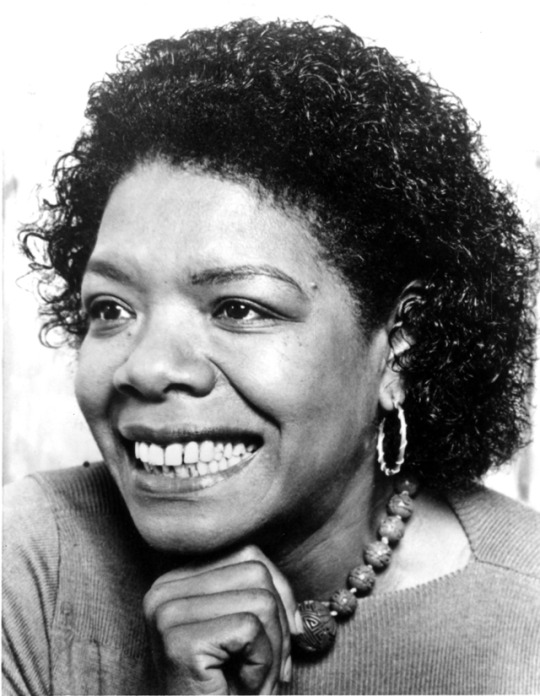

Both the poem and the TEDx talk make me think many thoughts this week. Elizabeth’s talk reminded me of the sad but true tragedy that many women will face in their lifetime. I was particularly interested when she said, “When violence against women happens it’s a quick hashtag or byline, names and stories are forgotten”. I found this quote particularly powerful because it made me think of the media today and how many people all over the world react when we hear about domestic violence and other attacks against women. This line made me think back to the #bringbackourgirls and other hashtags like #MeToo, #TimesUp and #WhyIStayed. These hashtags were all very popular when they were trending but what about them now? Can we recall these women? The sad reality is that we don’t remember the women who spoke out against their abusers or even the children who were abducted in Nigeria. They were erased from our memory once the next tragedy was reported. I believe this talk covered a very important topic that can be hard to talk about, but it needs to be addressed so hopefully we can find a way to fix this problem in our society. I made a connection to when she spoke about the high schooler who was murdered by her boyfriend. My brain immediately went to that story of Maren Sanchez. Maren was a high schooler who was murdered after she said no to a boy who asked her to prom. Stories like this are extremely upsetting and often make us scared. That’s why Elizabeth herself said that she finds herself writing guidebooks on how she’s going to raise a daughter to deal with this world. Being a woman comes with so many extra precautions that often times don’t apply the same to men. I know when I first said I wanted to go to college the men in my family immediately told me that I should get pepper spray or another way of self-defense just in case. This same advice often isn’t given to college aged men. Another point I’d like to bring up from her TEDx talk is when she compared poems to artifacts. I know many times when we think of artifacts, we think of tangible objects like gold or silver made items from the past. Why don’t we think of poems as artifacts? Works of art are included under the definition of an artifact so why doesn’t society as a whole view them as such? I believe that we should view them as such because they are indicative of past human life and history. Maya’s poem is an example of an artifact I believe.
Maya used Still I Rise to show her oppressors that no matter what they say or do to her she won’t be beat down by them. She shows courage when the face of evil is present in her face. Maya says the word you not directed at the audience reading it but her oppressors. She tells her oppressors that their gossip and words have no power of what she believes to be true about herself and women of color in general I believe. In the second stanza we see her self-confidence and positive attitude shine. She uses the words “Cause I walk like I've got oil wells Pumping in my living room” to show this very well. Maya is example of a strong feminist that many women look up to and admire for her advocacy in social justice. I thought her tone when performing the poem was very different from how I read it in my head. She gave the poem a sense of happiness and humor even though the topic was based around a hard topic to view in a positive light. One question I had while watching her performance was “How can you be so happy even when you’ve faced all this discrimination and hatred?”. It’s amazing that her spirit wasn’t able to be broken by those who had prejudices against her. Her tone overall affected how our class viewed her poem. Maya’s poem is a great example of how having a positive attitude even in times of darkness is very much possible.
1 note
·
View note